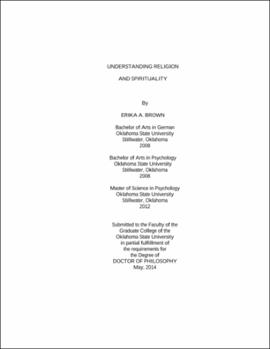| dc.contributor.advisor | Grice, James W. | |
| dc.contributor.author | Brown, Erika A. | |
| dc.date.accessioned | 2015-06-17T20:05:01Z | |
| dc.date.available | 2015-06-17T20:05:01Z | |
| dc.date.issued | 2014-05 | |
| dc.identifier.uri | https://hdl.handle.net/11244/14741 | |
| dc.description.abstract | The past several decades have witnessed a trend of esteeming empiricism to the point of vilifying philosophical knowledge, which has resulted in conceptualizations of religion and spirituality that are increasingly polarized, incomplete, and theologically and philosophically bankrupt (Adler, 1941; Pesut, Fowler, Taylor, Reimer-Kirkham, & Sawatzky, 2008; Zinnbauer, Pargament, & Scott, 1999). A related effect of discrediting and discarding philosophical knowledge has been the recent emergence of the claim of being spiritual but not religious (Hill, et al., 2000). The overarching aim of the current study was to evaluate the validity of this claim within the context of the anthropology of Saint Thomas Aquinas, endeavoring to understand religion and spirituality as they operate within the context of the whole person. Using a structured interview with individuals who identified themselves as spiritual but not religious, the primary goal was to demonstrate that this claim does not make existential sense. The secondary goal was to compare those who identified themselves as spiritual but not religious to those who identified themselves as both spiritual and religious in terms of the quantity and type of actions they listed to characterize their spirituality. Data were analyzed using Observation Oriented Modeling (Grice, 2011). Results provided unequivocal support for viewing religion and spirituality within the context of the teachings of Aquinas. At the end of the interview, 88% of those who identified themselves as spiritual but not religious modified their claim in such a way as to bring it in line with Aquinas' assertion that religion is necessary for an individual to develop spiritually. Those who were both spiritual and religious tended to list more actions that they perform as a result of their spirituality. Moreover, their actions were more likely to fit the criterion for truly being considered a spiritual action. The implications of these results are that the claim of being spiritual but not religious is not consistent with the existential reality of the person in that it disintegrates the individual by asserting that the will operates entirely independent of the intellect. | |
| dc.format | application/pdf | |
| dc.language | en_US | |
| dc.rights | Copyright is held by the author who has granted the Oklahoma State University Library the non-exclusive right to share this material in its institutional repository. Contact Digital Library Services at lib-dls@okstate.edu or 405-744-9161 for the permission policy on the use, reproduction or distribution of this material. | |
| dc.title | Understanding religion and spirituality | |
| dc.contributor.committeeMember | Abramson, Charles I. | |
| dc.contributor.committeeMember | Fuqua, Dale R. | |
| dc.contributor.committeeMember | Thompson, Michael D. | |
| osu.filename | Brown_okstate_0664D_13254.pdf | |
| osu.accesstype | Open Access | |
| dc.type.genre | Dissertation | |
| dc.type.material | Text | |
| dc.subject.keywords | aquinas | |
| dc.subject.keywords | definitions | |
| dc.subject.keywords | philosophy | |
| dc.subject.keywords | religious | |
| dc.subject.keywords | spiritual | |
| thesis.degree.discipline | Lifespan Developmental Psychology | |
| thesis.degree.grantor | Oklahoma State University | |
